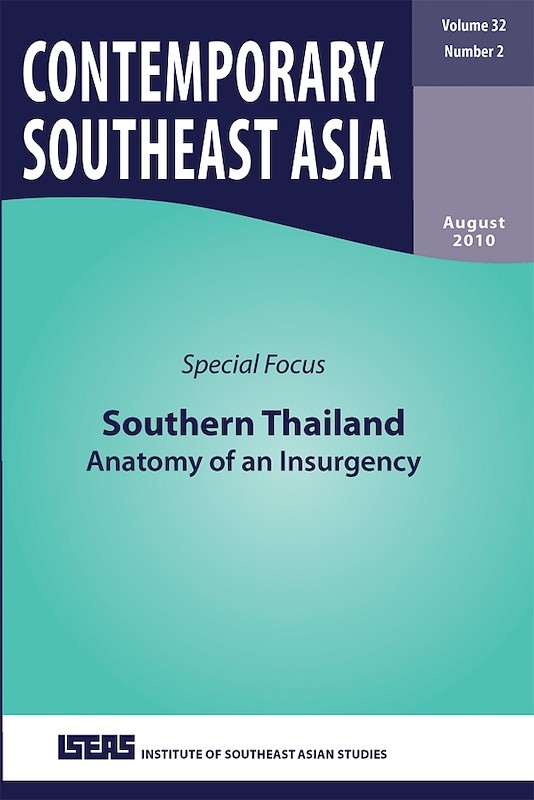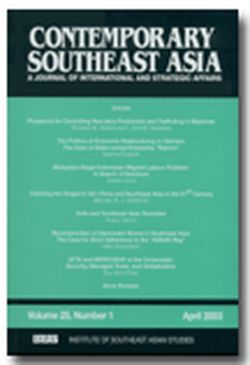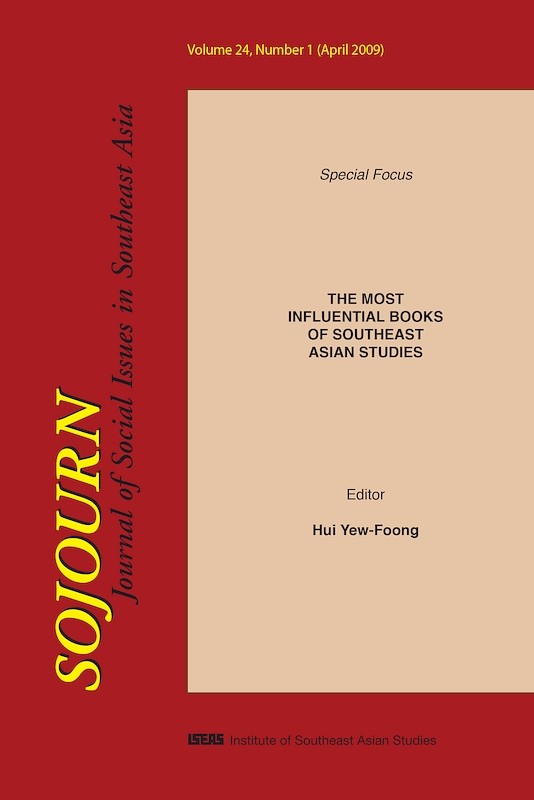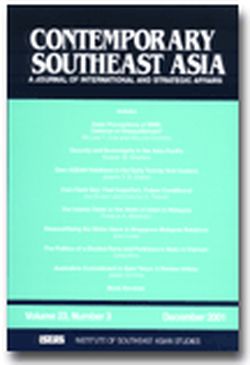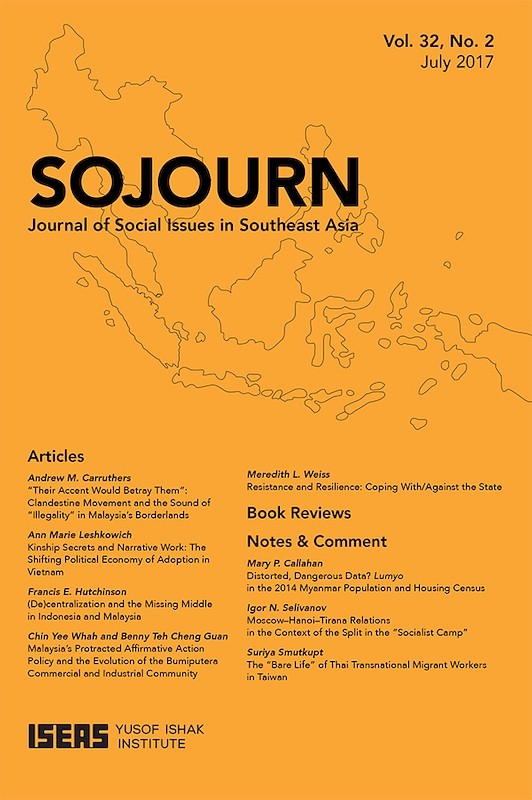SOJOURN: Journal of Social Issues in Southeast Asia Vol. 16/2 (Oct 2001). Special Focus on "Negotiating the State in Vietnam"
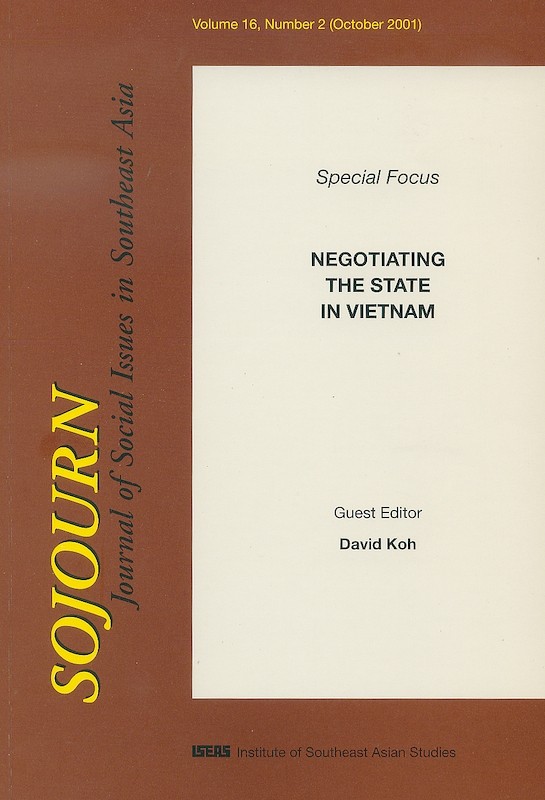
David Koh Wee Hock, author
Date of publication:
October 2001
Publisher:
Institute of Southeast Asian Studies
Number of pages:
176
Code:
SJ16/2
About the publication
SOJOURN: Journal of Social Issues in Southeast Asia is a refereed journal published for the Regional Social and Cultural Studies Programme by the Institute of Southeast Asian Studies in April and October.
Contents
-
Preliminary pages, with Editor's Note
-
Introduction: Analysing the State in Vietnam, by Benedict J Tria Kerkvliet, author
-
Rules and Resources: Negotiating the Household Registration System in Vietnam under Reform, by Andrew Hardy, author see abstractUnder Vietnam's subsidy system that lasted until the late 1980s, the state made many decisions about people's lives. Among these rules were those on household registration (ho khau), which closely regulated people's movement. The doi moi reforms dismantled the state's hold on employment, but the ho khau system -- administered by the police -- remained an important tool of control over the population. It is used for the purposes of identification, eligibility for state employment, and police work, as well as to restrict migration into the cities. This article argues that the limited room for maneouvre around the household registration system before reform has greatly expanded since the 1980s. The resources that ordinary people drew upon to negotiate the state's attempts to control their place of residence have also undergone a transformation. While contacts were always necessary for any negotiation with officialdom before doi moi, these have become increasingly commercialized. The need for their use, however, has diminished as people find it convenient in many circumstances to ignore the rules.
-
Media Negotiating the State: In the Name of the Law in Anticipation, by Russell Hiang-Khng Heng, author see abstractA high-profile legal reforms programme has raised expectations that improved laws will make it easier for society to negotiate the Vietnamese state. In the case of media, revising the Press Law has entailed a debate on how much legislation can or should protect press freedom from state interference. Given the limited press freedom in the Vietnamese reality, there is criticism that the legislative process is more rhetoric than substance. This article goes beyond the "press freedom" paradigm to look at how press legislation can trigger off some forms of state-media negotiation dynamics. Three cases studies involving conflicts between journalists and the courts/police point to a heightened awareness of legalistic challenges to figures of authority. The analysis of these situations also recognizes the peculiarities of Vietnam's Leninist press system where state and media are not always distinct and separate. Press freedom does not provide the sole or even main operating context for all these circumstances. A better understanding of how the law figures in the media's negotiation of the state should bear in mind that state and media players are all locked into a form of administrative politics, born of the fractious internal dynamics of a segmented state.
-
An Approach for Analysing State-Society Relations in Vietnam, by Benedict J Tria Kerkvliet, author see abstractThis article examines four arenas in Vietnam's political life in which state-society relations are problematic: governing institutions and processes, mass media, agricultural collectives, and corruption. Each has evidence to support two common interpretations, which argue that the state and its various organizations in society run the political show in Vietnam. Yet, there is also evidence for a third interpretation, which highlights political activities in society beyond the reach of the state and its organizations. The article also finds ongoing deliberations in each arena about what relations between the state and society should be.
-
Negotiating the Socialist State in Vietnam through Local Administrators: The Case of Karaoke Shops, by David Koh Wee Hock, author see abstractThis article examines policy implementation problems that occur when Vietnam's party-state tries to enforce its rules on "social evils", a short-hand term for social problems such as drugs and prostitution, in karaoke shops. It argues that these micro-level implementation problems manifest the issues of how the party-state does not act as one, and how its inefficient and corrupt parts can turn a supposedly powerful party-state into a weak policy implementation organization. The conceptual implication that anchors the article is the need to adjust how popular discourse usually views the Vietnamese party-state and its relationship with Vietnamese society, which usually equates "communist" with "repressive" or "authoritarian". This view is certainly inaccurate and incomplete when state-society interactions in many socioeconomic arenas of Vietnam are considered, beyond the political arena on which the popular view is usually based on. A more balanced view is possible when the party-state is disaggregated to illustrate how local administrators make a difference to state-society relations in Vietnam.
-
Public Spaces/Public Disgraces: Crowds and the State in Contemporary Vietnam, by Mandy Thomas, author see abstractThis article argues that a semantic shift in the crowd in Vietnam over the last decade has allowed public space to become a site through which transgressive ideologies and desires may have an outlet. At a time of accelerating social change, the state has effectively delimited public criticism yet a fragile but assertive form of Vietnamese democratic practice has arisen in public space, at the margins of official society, in sites previously equated with state control. Official state functions attract only small audiences, and rather than celebrating the dominance of the party, reveal the disengagement of the populace in the party's activities. Where crowds were always a component of state (stage)-managed events, now public spaces are attracting large numbers of people for supposedly non-political activities which may become transgressive acts condemned by the regime. In support of the notion that crowding is an opening up of the possibility of more subversive political actions, the paper presents an analysis of recent crowd formations and the state's reaction to them. The analysis reveals the modalities through which popular culture has provided the public with the means to transcend the constraints of official, authorized, and legitimate codes of behaviour in public space. Changes in the use of public space, it is argued, map the sets of relations between the public and the state, making these transforming relationships visible, although fraught with contradictions and anomalies.
-
BOOK REVIEW: Genders and Sexualities in Modern Thailand. Edited by Peter A. Jackson and Nerida M. Cook, by Annette Hamilton, author
-
BOOK REVIEW: White Love and Other Events in Philippine History. By Vicente L. Rafael, by Filomeno V Aguilar Jr, author
-
BOOK REVIEW: Urbane Rationalität. Eine stadtanthropologische Studie zu Ujung Pandang (Makassar), Indonesien. By Christoph Antweiler Klner, by Rudiger Korff, author
-
BOOK REVIEW: Behind the Postcolonial: Architecture, Urban Space and Political Cultures in Indonesia. By Abidin Kusno, by Peter J M Nas, author
-
BOOK REVIEW: Overturned Chariot: The Autobiography of Phan Boi Chau. Translated by Vinh Sinh and Nicholas Wickenden., by Nick J Freeman, author

